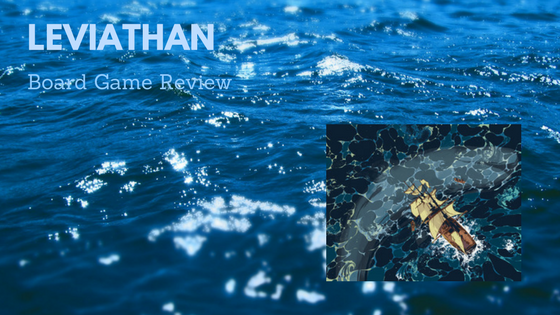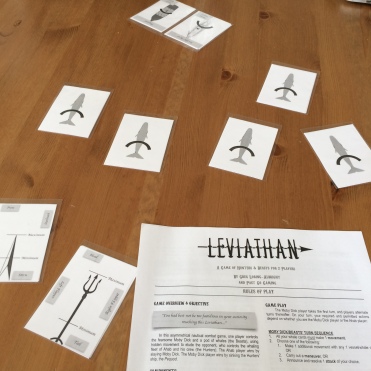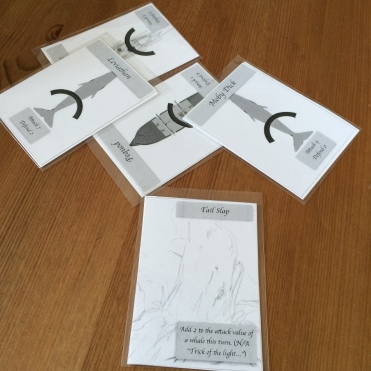
Other than board gaming, I love to read. I’ll read almost everything – with the exception of a few genres that do not appeal to me. I will give any author a chance, including new emerging authors as well as authors who supposedly wrote the classic literature cannon. One of these authors is Herman Melville most well-known for Moby Dick and other nautical tales of woe. I’ll be honest and admit, I never have read Melville because I heard his writing is incredibly dry. And that has caused me to shy away every time I have to opportunity to pick the next book I read. I have also heard from folks that Moby Dick is their absolute favorite novel of all time. So who knows, right?
In the past, I played and reviewed another game from the designer Greg Loring-Albright, Hyperspace Smuggler, a pick up and delivery space game. I have heard has been further developed and will be shown off at PAX Unplugged this year. I am excited to see where Greg has taken Hyperspace Smuggler, but this post is not about that game so let’s get down to business.
Leviathan is a 2-player, tactical card-based microgame with a freeform feel to it. Okay, that’s a mouthful so here are the details. One player is Captain Ahab and his crew, wandering the wide ocean hunting for Moby Dick. The other player controls Moby Dick and a pod of highly intelligent, almost telepathic whales as well as two decoy whale cards (“trick of the light”). The goal of both players is to destroy the leader of the opposition.
I initially thought that Leviathan could be dragged out by avoiding and running away, but the game almost forces combat through a couple of interesting mechanisms and design choices. First, the movement angles of both players are limited and it is very challenging to move away from your opponent if they are pursuing you. Second, only the whales can make a fast 180 degree turn. That special type of movement helps the whale player in particular as they have the largest incentive to attack, having all the information. The Ahab player has a harder time due to the hidden information but they also get an optional attack action every turn – so if the Ahab does choose to attack, they do not waste an action on attacking. While the Ahab player may be more reluctant to attack, there is no real incentive to run away. Ahab also has resources at it’s disposal to mitigate the hidden information and deduce where Moby Dick may be.
Moby Dick and the pod of whales are a very powerful faction and might be easier to play; however, I do not think the game is unbalanced. Since the each of the whales move every turn, Ahab may find themselves cornered or surrounded pretty fast. In addition to fast movement, the whales can carry out an undersea maneuver which allows two whale cards to switch places. However, with the right movement and deployment of backup ships, Ahab can effectively fend off whale attacks while deducing where Moby Dick is. It took a couple of games to see Ahab win, but I think it would happen more often the more I play. A big part of the Ahab win came down to using a special power card at the right time in order to reveal Moby Dick’s location and then converge for the final battle.
Speaking of special power cards: Each player also has a hand of special power cards that can change the game in an instant. The one I was talking about above allows the Ahab player to reveal one whale card. while it might seem random at the beginning of the game, the card becomes very powerful as more whales are knocked out. Other special power cards may allow for extra movement, extra attack value, revealing a whale, and nullifying an attack. These cards are clutch and can win the game if played at the right time.
I really like how the players can alter the game to make it easier or more challenging for one player. For example, you could limit the number of special power cards a player has or limit the number of vessels/whales a player can move per turn. If one side seems overpowered, there is always a good solution for the next game. Personally after playing the game initially, I thought the whales could move very rapidly and limited the number of movements (only half the pod) per turn. That helped structure our game more evenly as we were learning the mechanics and tactics.
I had one issue while playing the game using the movement measurement cards. For basic movements, the mechanism was okay at best. I found myself and my opponent accidentally bumping cards while trying to measure a movement. This did not really impact the game but it did feel a little tedious. In addition, using the “whale swap” special action, I had a similar challenge marking the space and orientation of one of the whales. Maybe this is in part because I am not a miniatures tabletop game player and have not had experience in this style of movement. While I did struggle with it, the movement measurement cards did not take away from the fun I had playing.
Leviathan would be a great game for anyone looking for a 10-15 minute two player experience they can take anywhere. I really do mean anywhere because regardless of playing surface or objects on the playing surface, this game works like a charm. In my experience, the game is a lot of fun with obstacles on the table, forcing the players to adapt to their surroundings game to game. Also, the game can be altered to fit the table space available – if you have a small table (2×2), you could elect to limit the number of whales in the pod and the number of boats Ahab can deploy. Regardless of where you are, you can always find a place to play.
The Kickstarter has a few days left and I would encourage you to pledge and help the project fund!


Discussion
Trackbacks/Pingbacks
Pingback: Finding out the Truth | Reading and Gaming for Justice - November 3, 2017
Pingback: Leviathan Relaunched! | Reading and Gaming for Justice - February 16, 2018